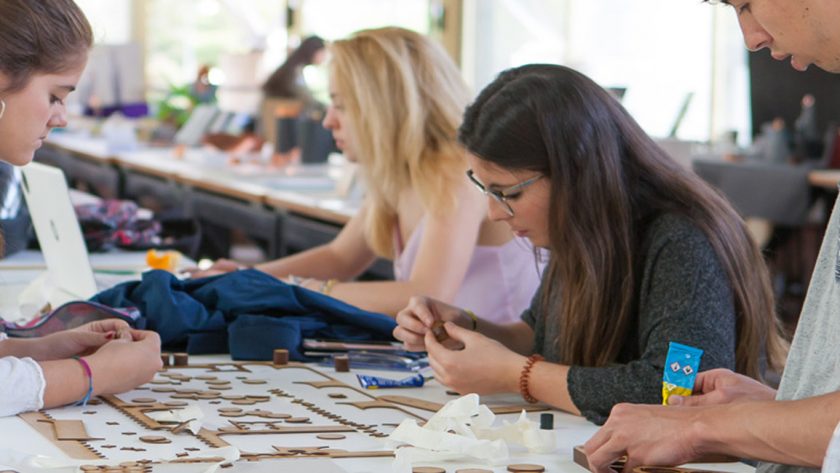My first experience working in jobs overseas Europe began with a beautiful German girl I met on a train to Portugal. We fell in love, left our respective traveling buddies, and took off to explore Europe together.
After a couple of months, reality set in. Nathalie was preparing to go to college, and I had only come for the summer. But now I wanted to stay, and that meant finding work. I moved to Prague while Nathalie went back to Germany. In 1992, an American in Prague could do just about anything. I met Americans fresh out of college, who, with a couple thousand dollars started restaurants (which are still there today), theater groups, design companies–you name it. And for people like me–young and unskilled–there were plenty of opportunities teaching English, working in American–themed restaurants or picking up odd jobs.
Working in Europe today is tough and depends on many factors, including skills, experience, and luck. I believe the most important tool to have in your search for a job is a whole lot of patience. You have to be absolutely determined to work–and work at anything in the beginning. Once the first paychecks start rolling in (or being slipped under the table), it’s only a matter of time before new and better opportunities present themselves.
I did find work that first summer, and ended up staying in Europe for eight years. I was a dishwasher, designer, bank clerk, truck loader, official police lineup suspect. The jobs are there–it’s up to you to find them.
ENOUGH CASH TO GET BY
Many Americans who want work in Europe have expectations that might be reasonable for the States, but which don’t quite work abroad, literally. Part of the problem is cultural–it is quite normal for an American to work part–time in bars, restaurants or retail stores; you just fill out an application. In Europe, many of the jobs we consider “temporary,” such as retail or restaurant work, are real jobs, with benefits, vacations and a living wage. Competition for these jobs is fierce, and the likelihood of finding a part–time spot in a restaurant is slim to none if you walk in and ask for an application.
So how to do it? Once you are settled somewhere, explore places in your neighborhood. Bars are a much better bet than restaurants, because the language barrier is less of a problem (a Mai Tai is pretty much a Mai Tai everywhere). Do not walk in the first night with your eyes still glazed from jetlag and slur out “Can I have a job?” in the local dialect. This kind of forwardness is generally not appreciated and will get you nowhere. On your first night, have a drink and wipe off the dust from the road. Go back the next night for more of the same. Chat with the bartender, the regulars, the old guy playing Flamenco guitar. Become a regular yourself. Once everyone gets used to you, perhaps even friendly, bring up your situation: “Ah yes, I came here because of the rich culture/history/beaches/nightlife. If only I could stay…”
At this point, odds are if you aren’t offered a job there probably isn’t one, because in reality it is rather exotic to have an American employee.
English–teaching jobs are another good idea. There are resources on the Internet for finding these types of jobs in advance, but they tend to be more selective than positions you may stumble upon while abroad. The better teaching jobs in Europe usually require teaching credentials (such as TEFL certification,) or experience.
When looking for jobs teaching English in person, American initiative plays a great role. You can demonstrate the valued skills (explaining the intricacies of gerunds and beauty of slang) that employers want. But that’s not enough–presentation is important, too. Even if you have been bumming around Europe for a few months, put on your nicest clothes, ditch the baseball cap and the tennis shoes, and present yourself as well–organized and thorough. If they think you are likely to take off to Greece in a few weeks they won’t be contacting you.
English–language ability is not just useful for teaching. My friend Tony spent a few years traveling around Europe teaching English. After a couple of years he had had enough, and was determined to find a job doing anything but. Six months after he moved to Madrid he was contacted by an American friend about an opportunity subtitling Spanish films into English. After a few freelance gigs, Tony was hired full–time and subtitles films from Spain, Italy and France, and translates English vernacular into those respective languages, which he picked up in his travels. Of course, it helps to be handy with a translation dictionary, at least.
Americans in larger cities can also find voice–over, copywriting, or editing jobs. Look for newspapers that are printed in English, call them up, and see what they have to offer. You won’t be the only one, but it’s a start.
YOU PROFESSIONAL, YOU!
Some of us have slung enough drinks, washed enough dishes, served enough food, and tried enough times to explain the difference between count and non–count nouns to swear off that kind of work off forever. We’re a little older, maybe have a couple of years of work experience or graduate school, and for whatever reason want to go back and try living in Europe again. Our expectations are a little higher because we know what we can do, and are ready to do it.
Finding a job is still possible, but much of what I mentioned above about patience, determination and the willingness to do anything still applies. Unless you can bring enough cash to support yourself completely while you look, you will have to find other work. Networking becomes extremely important at this point. Imagine all of the actor/bartenders in L.A.–they plug and plug until they meet the right people and voila! They get that paying gig as the guy in the background in that commercial. Your odds of succeeding are increased a hundred fold if you know people who can eventually put you in touch with jobs–or people who know about jobs. Adding a local reference to your resume (Curriculum Vitae or CV in Europe) can do wonders. If an employer has to call the U.S., your resume is probably going in the round file.
Contrary to popular belief, it is not impossible to work legally in Europe. The EU is not worried about hordes of Americans rushing in to take their jobs–more likely, people will be incredulous when you tell them that you actually want to work in Europe. Still, it’s not easy to obtain a work permit, but it is possible. My friend Michael was working with me in France when he decided to move to Germany. He had a background in management, and was finishing his masters degree part–time in Seattle. The rest of the time he was in Hamburg working part–time (and unpaid) with a German friend who was starting a consulting business. Michael had saved some money in France and was supporting himself. Through a friend, he met someone who worked at Siemens Corporation. Michael got an interview, used his consulting–business friend as a reference and within a few weeks was at city hall picking up his work permit.
This story is not unique. When I was looking for work after falling for the beautiful German girl, I found myself in a little town in the north of Germany. Nathalie’s friend’s father was an architect who knew a carpenter who needed an apprentice. Nathalie’s other friend’s brother worked in the city hall. Before I knew it I had a work permit in my hand and I was sanding staircase banisters eight hours a day, eating raw pork mixed with onions on bread rolls every fourth Thursday, making $12 an hour and living in Germany.
IT TAKES A SPECIAL BREED
Those of us who move to Europe to work for a while tend to think of ourselves as a pretty special breed–and up to a point, we are. It does take a lot of courage to make that transition. But we are competing for jobs in a foreign country against 10,000 people whose four–year–old nieces speak the language better than we do. It is going to take time, but if all we wanted was the job, we would have stayed in the U.S., right? We are going for the life experience. It will take time but that’s okay, use that time. Work on the language, go to a Salsa class, check out the art museums. Not only will you be a better person for it, think of all the great stuff you’ll have on your resume when you start looking for work in the States.



